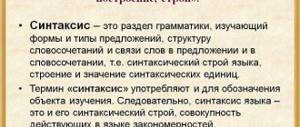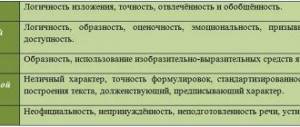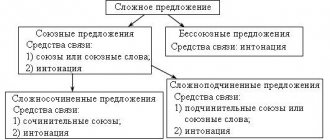Complex sentences with adverbial clauses. - presentation
Complex sentences with adverbial clauses
Greetings You splash a smile like the sun, leaving the gate in the morning. You see, everyone in life has plenty of troubles and worries. Do we really love gloomy faces or someone's angry speech? You will be able to share a smile and ignite a reciprocal spark. Give each other smiles. Smile at each other, at yourself! Do this favor, Smile for me, please!
Objectives of the lesson To repeat the features of adverb clauses with different types of adverbial clauses To learn the distinctive features of adverbial adverbial clauses (structure, means of communication, position in the clause) To learn to recognize clause clauses with adverbial clauses among other clauses To improve the ability to analyze clauses
The motto of the lesson: “Towards the beautiful!” What a lump the Russian language is! The beauty is inexplicable and still unknown... Only a captivated, inquisitive mind can understand it and master it. This is the destiny of the young and persistent... Dare, young ones, search, comprehend, create! K.G.Paustovsky
Preparing for the Unified State Exam 1. In which word is the sound IзI pronounced? 1) story 2) on the side 3) sharp 4) word 2. In which word does the stress fall on the first syllable? 1) sorrel 2) white-hot 3) understood 4) created 3. Which word has the suffix -chik- meaning “small”? 1) ball 2) cucumber 3) locker 4) key 4. In place of which numbers in the sentence should there be commas? On the wall (1) where the artist (2) sat and painted a picture (3), the rays of the setting sun fell obliquely. 1) 1, 2 2) 1, 2, 3 3) 2, 3 4) 1, 3
EXAMINATION. 1)2; 2) 3; 3)3; 4)4;
“The sentence is a great invention of mankind, as is the word. Everything is in it: the abyss of the Universe, and the depths of the sea, and the mysteries of existence, and the centuries-old dust of Eternity...” D.S. Likhachev
Let's repeat, remember...
Complex sentence A complex sentence is a sentence that consists of two or more parts, connected into one whole in meaning and intonation. The sky became cloudy again and it began to rain. Vladimir saw with horror that he had driven into an unfamiliar forest. The moon was not in the sky: it rose late at that time.
Compound sentences In a complex sentence (CCS), the parts are connected by coordinating conjunctions, have equal rights, and are independent of each other. The dusk became thicker, and the stars shone higher.
Complex sentences Complex sentences are sentences in which simple sentences are connected by intonation, subordinating conjunctions or allied words. A complex sentence (CSS) consists of unequal parts, where one part depends on the other. The independent clause is called the main clause, and the dependent clause is called the subordinate clause. To reach the goal, you must first go. (O. Balzac) (p. to…….), [……….]. Do not get close to people whose conscience is too flexible. (E. Delacroix) [… noun], (v. who have….).
Types of subordinate clauses Determinative Explanatory (additional) Circumstantial
Determinative subordinate questions of definition [...± uk. sl. + noun ], (sl. which, which, whose, who, what, where, when, etc...). We love a home that loves us
Explanatory subordinate questions of addition [... verb], (p. what, as if, so that, how, as if, etc., words who, what, how, why, why, where, why, how many, whose, etc....) . I love it when the pine tree makes noise
Graphic dictation 1. A person who cannot break a bad habit is worthless. 2. I read that souls are immortal. 3. The house in which I live is located near a river. 4. My heart had a presentiment that something bad would happen. 5. It is not the place that makes the man, but the man the place. 6. A small river flows in the dewy meadows, which is so dear to me. 7. In the morning, the autumn rain carefully attached earring drops to the pine needles, which hung on each needle for a long time.
Circumstance in PP By significance, the circumstances of 1) the course of action are distinguished (how? in what way?): We went on foot. 2) time (when? since when? until when? Since what time? how long?): We arrived yesterday. 3) places (where? where? from where?): I ran forward. 4) reasons (why? why? for what reason?): I’m dizzy from fatigue. 5) goals (why? for what? for what purpose?): I came to make peace. 6) measures and degrees (to what extent, extent?) These circumstances mainly relate to adjectives, participles, adverbs: He was very attentive and did everything absolutely correctly. 7) conditions (under what conditions?): You can’t go there without calling. concessions (despite what?): Despite the rain, we still left the house
2) time (when? since when? until when? Since what time? how long?): We arrived yesterday. 3) places (where? where? from where?): I ran forward. 4) reasons (why? why? for what reason?): I’m dizzy from fatigue. 5) goals (why? for what? for what purpose?): I came to make peace. 6) measures and degrees (to what extent, extent?) These circumstances mainly relate to adjectives, participles, adverbs: He was very attentive and did everything absolutely correctly. 7) conditions (under what conditions?): You can’t go there without calling. concessions (despite what?): Despite the rain, we still left the house
Circumstantial subordinate questions of circumstances [...], (conjunctions and allied words...). Subordinate clauses, time, cause, effect, manner of action and degree, comparison, purpose, condition, concession. If the sun is not put out, there will always be bunnies! (Subordinate clauses) Even if the ink has not yet dried, words have already been given immortality. (Additional concessions)
Adverbial clauses Manner of action and degree (how? in what way? to what extent or extent?) Conjunctions - that, so that, as, as if, as if; allied words - how, how much, etc. Time (when? how long? since when?) Allied words - when, while, as soon as, barely, while, etc. Places (where? where? from where?) allied words words - where, where, from. Reasons (why? why? for what reason?) Unions - because, since, because, for, especially since, thanks to, in view of the fact that, etc. Purposes (why? for what? for what purpose? Unions - so that , in order to, etc. Conditions (under what condition?) Alliances - if (would), when, if, once, if, etc. Concessions (despite what? in spite of what?) Alliances - although, let, despite that what, conjunctive words - no matter how, whenever, no matter how much, who nor, etc. Comparisons (how? how much?) Conjunctions - as, as if, as if, exactly, by that - with what, etc. Consequences (what follows from this? ) Unions - so.
Adverbial adverbs Why are they called so - adverbial clauses? Subordinate adverbial Concessions Conditions Goals Reasons Comparisons Measures and degrees Manner of action time place of investigation
Talking about the main thing... Why are adverbial clauses called that? By what features should they be distinguished from other subordinate clauses?
Our research Most adverbial clauses have the same meanings and answer the same questions as the adverbial clause in a simple sentence.
Distribution-digital dictation Assignment: listen to the sentences and write down the numbers of the sentences in 2 columns: in the 1st column of the SPP with subordinate adverbial clauses, in the 2nd - simple sentences with adverbials. 1. If my father was nearby, he threw back his head and laughed openly and foolishly. 2. Hastily dressed, he went out into the night. 3. When we were moving towards the school, Terekha’s voice was heard all the time behind us. 4. The two continued to walk despite the rain. 5. I stopped to take a break and rest. 6. When crossing the street, you need to be very careful. 7. One by one, the horses are led away to where human voices are heard. 8. He walked, nervously looking around, and thinking about his own things. 9. Now I have become happy forever, because I am not looking for happiness. 10. The earth dries quickly due to warm weather.
Test yourself Key: SPP - 1, 3, 5, 7, 9 PP - 2, 4, 6, 8, 10
physical education (set of exercises for the eyes). Close your eyes, without straining your eye muscles, count to 5, open your eyes wide and look into the distance. Look at the tip of your nose and look into the distance. Without turning your head, make slow circular movements with your eyes clockwise and back. Look into the distance, then make diagonal movements in one direction and the other. Close your eyes, count to 5 and slowly open.
“Alone in the field is not a warrior” Write it down. Determine the main and subordinate parts. Based on the question and conjunction (or allied word), determine the type of subordinate clause. 1. The road was washed away by the rain so much that potholes formed along the edges. 2. The sun illuminated the tops of the linden trees, which had already turned yellow under the fresh breath of autumn. 3. He willingly agreed with everything the captain said. 4. Nowadays, perhaps, you will not find places where no human foot has gone. 5. As soon as I entered the edge of the forest, I immediately came across wild boars.
Let's summarize... How to determine the type of clause? 1. Ask a question from the main part. 2. Determine which part of speech it depends on. 3. Find out the means of communication. 4. Establish a semantic connection between the parts. 5. Draw a conclusion.
Let's summarize... Continue the phrase: Adverbial clauses answer.... denote ………. Depend on….. in the main part and join…. Adverbial clauses can take up…………
Let's try it ourselves... (SPP simulation) We set up camp. The river makes a sharp turn. The grass was lush. It rained in May. I'll come see you. I will have free time. The trip to the island had to be postponed. There was a strong storm at sea. It was warm in the forest. There was still snow in the shady places. We hoped. Our team will be the winner in the upcoming football matches.
Homework Paragraph 8, page (table) 1) Text 33 “Love, respect, knowledge” creative task 2, 2) Exercise 66 (one task to choose from)
The lesson is over The lesson is over. Call! It's time to rest. But don’t forget to learn what you learned today!
Lesson summary “SPP with subordinate modifiers” in Russian for grade 9
Topic: Icons with subordinate clauses. 9th grade.
Teacher: Ibraimova Zh.E
Lesson objectives
1) find attributive clauses as part of a complex sentence; 2) place punctuation marks correctly (separate subordinate clauses with commas); 3) draw up sentence diagrams with attributive clauses.
Lesson type
: learning new material
Lesson equipment:
computer
Handouts: paper, pencils
DURING THE CLASSES
- TRAINING “I wish you”
- Organizational moment
- Updating.
Before we move on to a new topic, let's remember what we learned earlier, but first we will divide into groups according to the color of the figure.
Task 1: “Restore the scheme”
(timer 2 min.)
A) protection of posters
B) grading on stickers with an explanation (and on the evaluation sheet)
(take their seats)
Task 2. Let's play "Yes-no"(
for each correct answer - a figure)
- SPPs consist only of subordinate clauses
- A subordinate clause can only come after the main clause
- An independent P within an IPP is called the main
- NGNs with explanatory clauses answer case questions
- Where, where, from where - coordinating conjunctions of place
- Or, or, that- divisive coordinating conjunctions
- In the morning, when I left the house, there was a warmth from
- Conjunctions and allied words are members of a sentence
- As if, exactly, as if - conjunctions of degree
- SS and P learns syntax
Let's sum it up
(
Let's return to the poster
) What syntactic unit are we considering?
What subordinate clauses in IPPs have we not yet considered in detail?
Write down the topic of the lesson, great job. We formulate a goal. (to know, to be able to)
Let's remember what we know about relative clauses. ZUH table
I KNOW
| LEARNED | I WANT TO KNOW |
| QUESTIONS OF RELATIVE CLAUSES | WITH THE HELP OF WHAT DO THEY JOIN THE MAIN P. |
| Place in P |
- Studying a new topic. Divide into groups
"Find your soul mate"
- Working on posters. Paragraph 23-24, p. 63.
- Poster protection.
- Evaluation using emoticons, stickers
Exercise No. 1 from the textbook, p. 60.
Assignment: read, write down the highlighted sentences.
Weak level:
determine the topic of the text, find subordinate clauses
Strong level
: determine the type of subordinate clause, draw up diagrams of these sentences.
- Digital dictation
. Assignment: The teacher calls the P., giving the serial number of each, and the students fill in the corresponding columns of the P. numbers.
1. The buds bloomed on the trees and the birds flew in. 2. Don't go outside because it's already dark. 3. The sun was shining, but it was very cold. 4. I picked up the book that fell from the table. 5. I picked up the book that fell from the table. 6. Anger is passion, and passion excludes reason and logic. 7. The Russian people are smart and understanding, diligent and passionate about everything good and beautiful. 8. The root of the teaching is bitter, but the fruit is sweet. 9. They flatter in order to dominate under the guise of submission. 10. We are calm: slander and envy cannot turn white into black. 11. Knowledge that is not replenished daily decreases every day. 12. Oh, I was sure that you would come back.
13. Never listen to anyone who speaks bad about others and good about you.
5.3
.
Creative work.
Assignment: compile a P. according to these diagrams. Determine the type of clause.
For the weak: for the strong
1. [uk. sl. + noun ], (which - = ).
2. [noun. ], ( where = - and - ).
3. [noun], (which =).
5.4 Selective dictation
. Write down and indicate the IPP with subordinate attributive clauses, draw up diagrams.
1. If you are tired, let's rest.
2. I don’t know where the line is between a comrade and a friend.
3. Again I visited that corner of the earth where I had spent two years as an exile.
4. This was the area from which we had to move.
5. Grandfather nervously walked around the room and spoke as if we were not there.
6. All my life I have seen only people who love and know how to work as real heroes.
5.5. Independent work using cards. Work in pairs.
Task: Connect the halves of the joint venture. Indicate the SPP with attributive clauses. Check your work.
- Boring day until evening 1. We must study diligently
- A person should have favorite works, 2. If there is nothing to do
- To get a good profession, 3. So a person for work
- As a bird is made to fly, 4. To which he addresses himself repeatedly.
- Reflection
(“Ladder of Success”)
- Summarizing.
- Filling out the ZUH table
- Test.
- Assessment
- D.z
With. 63 No. 3, lesson 23-24 (syntax analysis)






